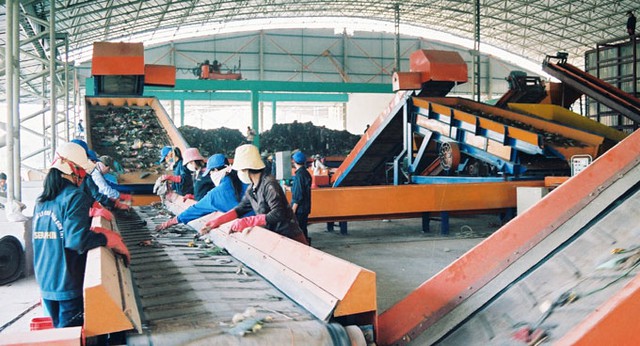 Environment
Environment


|
| A draft Prime Minister’s Decision is expected to establish the necessary legal framework for the enactment of extended producer responsibility. — Photo baochinhphu.vn |
HÀ NỘI — Deputy Prime Minister Trần Hồng Hà on Friday presided over a meeting on recycling costs and related administrative expenses for producers and exporters, highlighting businesses’ proactiveness in handling waste and recycling from their production processes.
The meeting reviews a draft Prime Minister’s Decision on Fs, which is a reasonable and valid norm of recycling cost per unit weight of a product or packaging (including costs of classifying, collecting, transporting and recycling), and the administrative expenses for the fulfilment of these producer/exporter responsibilities.
Deputy PM Hà emphasised that product and packaging recycling, as well as waste collection and treatment, are producer responsibilities recognised in current regulations - particularly the 2020 Law on Environmental Protection.
However, currently, most manufacturers and exporters have not fully abided by regulations on recycling, opting for financial contributions to a state-run fund instead of taking over the recycling process themselves or contracting a recycling company.
Hà said: “In principle, it is necessary to encourage businesses to carry out their recycling responsibilities according to the law or to contract qualified recycling firms.
“In cases where businesses choose to contribute financial support for recycling to the state-run fund, this contribution should be determined by Fs survey data from qualified recycling firms, with priority given to those possessing advanced technology.”
The promulgation of this decision is expected to establish the necessary legal framework to enact extended producer responsibility (EPR) as stated in the 2020 environmental protection law, according to the Ministry of Natural Resources and Environment.
The ministry has also surveyed the recycling costs at nearly 70 major recycling firms across the country to determine the Fs, while also making comparisons with other countries and territories with similar regulations on financial contributions to state-run funds for recycling.
According to the Việt Nam Waste Recycling Association, most recycling facilities at craft villages fail to meet the set standards.
Therefore, authorities need to strengthen inspection, monitoring and handling of unqualified recycling facilities and firms violating recycling regulations according to the 2020 environmental protection law, a representative of the association said at the meeting.
Deputy Minister of Planning and Investment Nguyễn Thị Bích Ngọc added that while recycling regulations are crucial for international integration and sustainable development, the Fs must align with businesses’ execution capacity and take into account increases in production costs and product pricing.
Regarding the administrative expenses for management, supervision and support related to producer/exporter responsibilities towards product and packaging recycling as well as waste collection and treatment, deputy PM Hà assigned the National EPR Council to study and decide on the suitable model, human resources and operational costs under the law.
At the meeting, he also reviewed the supervision of businesses’ compliance with recycling regulations as well as encouragement measures for household waste sorting and recycling. — VNS